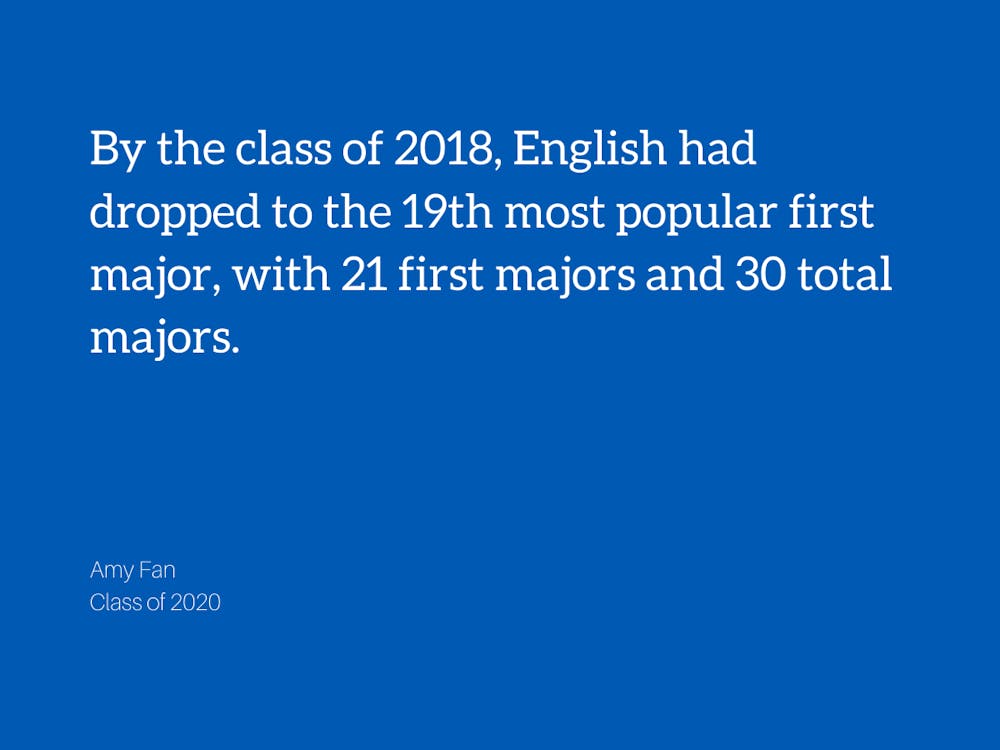When I’m cynical, I think that data is used as a tool for social control, collected and closely monitored by institutions without giving the people they serve a say on how it’s being used. I think about the tech companies that are under scrutiny for collecting massive amounts of data, and I wonder if our institutions (including Duke) are guilty of similar things.
I think about how using a series of data points to describe me undermines my right to tell my own story using the features I find relevant. Sometimes, that involves my race, class and gender. Sometimes, my name, hometown and major. Sometimes—oftentimes—neither of those factors are relevant. I see the ways in which the less privileged who get reduced to a set of data points, while the more privileged get complexity and nuance in their narratives.
When I’m less cynical, I believe that data can do a lot to explain and highlight social systems and that it has immense potential for doing good when placed in the right hands. Plus, data analysis can be…fun? So when I found out that Duke (and almost every higher-ed institution) reports the number and demographics of students who graduate in each major to the federal government each year as a condition of receiving Pell grants and participating in other federal student financial aid programs, I was curious. Maybe even excited.
Some of my past columns (using a dataset manually collected using things like the freshman directory, major graduation ceremonies, and a DSig composite in Devil's Krafthouse) found that Duke students came from overwhelmingly wealthy schools, certain majors had a disproportionate percentage of students in Greek life, and that double majors with computer science are really, really popular.
A few weeks ago, two Stanford undergraduates used that same federal dataset I found to try to figure out why there were so few Black and Latinx students in their economics classes at Stanford. In particular, they found that the share of Black women in the economics major has been declining on average since 2000.
What kinds of questions could this dataset answer about Duke? What’s interesting to ask?
The Chronicle recently featured a slew of articles about the English major, mostly centering around who’s being read, who can be read and who should be read. What about who's doing the reading? In other words, who’s in the major?
A few broad trends: Relative to other majors, the English major has declined in popularity. English was the seventh most popular first major in the class of 2011, with 72 first majors and 85 total majors, right behind political science and biomedical engineering. By the class of 2018, English had dropped to the 19th most popular first major, with 21 first majors and 30 total majors.
In their response to Victoria’s original column, the Director of Undergraduate Studies and the department chair for the English department noted that the number of English majors and double majors has increased by 40% since fall 2016. It’s unclear whether the numbers were significantly lower in the fall because many sophomores haven’t declared majors yet, and the data currently doesn’t extend to the classes of 2019 and 2020 to confirm nor deny this. If true though, that means the trend is reversing.
I've written many tangential critiques of preprofessionalism before: it focuses too much on specific, often technical, skills at the expense of context-specific knowledge or less well-defined skills, and it seems to value efficiency over everything else. Others have covered the subject as well.
But preprofessionalism has been the norm at Duke for a while. In 2006, nearly 40% of the graduating senior class went into finance and consulting. Those numbers went down after the 2008 financial crisis and have never completely recovered, but have presumably been replaced with tech jobs. According to the Duke Senior Survey, roughly 37% of graduates from the class of 2018 went into finance, technology, or consulting.
Former President Brodhead, himself an English professor, was quoted in a 2016 Chronicle article as saying that he has never known anyone who entered the consulting industry who didn't say that it was "a fantastical analytical training." ("As long as they remember how important it is to train oneself in the study of literature," he laughingly added.)
This decline in popularity isn't exclusive to English. History has dropped in popularity as well, from the seventh most popular major in 2012 to the 13th most popular major in 2018. To no one's surprise, one major has been growing rapidly in the midst of these two majors shrinking: computer science.
In 2011, there were roughly three English first majors for every computer science first major. In the class of 2018, just seven years later, those numbers more than reversed: for every English first major, there were seven computer science first majors.
Has what preprofessionalism looks like changed in recent years? Has Duke remained just as preprofessional as it’s been in past years, just more reflected in major choices now? The data nerd in me says we can’t be sure. My gut wants to say “I think so.”
In future parts of this series: What can looking at gender and race breakdowns by major tell us? Computer science is rapidly growing in popularity, but for whom? Some majors have higher projected earnings immediately post-grad—who’s in those majors?
Amy Fan is a Trinity senior. Her column, “fangirling,” runs on alternate Wednesdays. This column is part of a three-part series, “major madness,” exploring major enrollment data at Duke.
Get The Chronicle straight to your inbox
Signup for our weekly newsletter. Cancel at any time.

Amy Fan is a Trinity senior. Her column, "fangirling," runs on alternate Thursdays.

